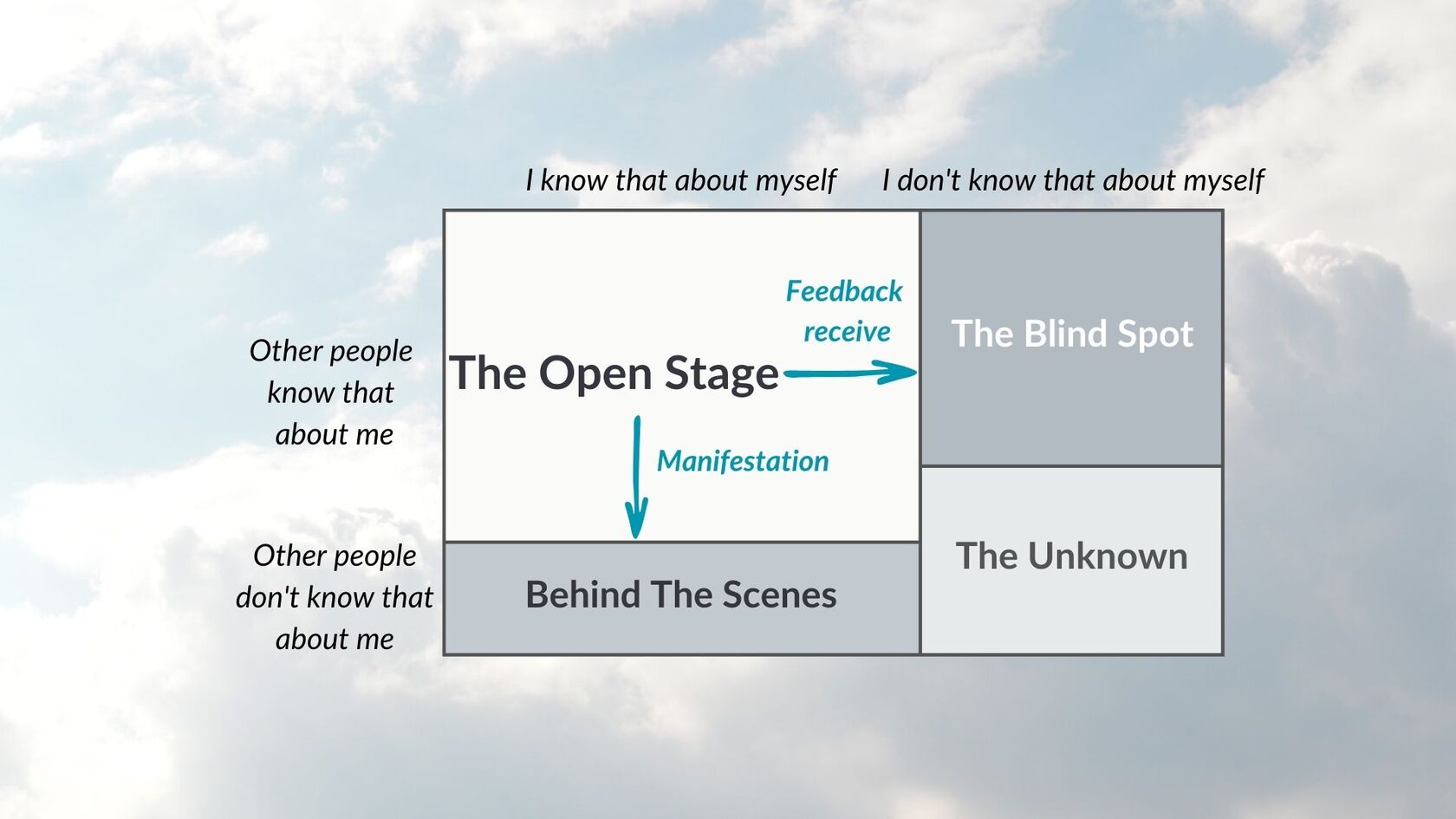
Many of us have probably heard of the so-called ‘blind spots’ in our self-perception. These are areas where we lack awareness or sober self-observation, leading to errors or mistakes in our thinking and behavior. However, when we identify and work on these blind spots, we improve our self-awareness and self-understanding respectively, our ability to communicate appropriately as well as our well-being. In this article, we discuss the ‘Johari Window’ and why it is important to recognise and examine our ‘blind spots’.

The Johari Window
The Johari Window is a simple model that helps people to better understand themselves and recognise how others see them. It is divided into four quadrants: the ‘Open Stage’, the ‘Hidden Behind The Scenes’, the ‘Blind Spot’ and the ‘Unknown’.
- The Open Stage: This quadrant stands for what is known to us as well as to other people (friends, relatives, colleagues), for example: ‘I am a football fan’.
- Behind The Scenes: This quadrant is about what is only known to us, but not to other people, for example: ‘I like to sing in the shower’.
- The Blind Spot: This quadrant is about what others see in our behavior, but which we do not perceive or notice ourselves, for example: ‘I often interrupt others in discussions’ (although I myself believe that such behavior is usually inappropriate). The well-known Russian proverb ‘see the mote in the other person's eye, but overlook the beam in your own’ describes the phenomenon of the blind spot quite aptly.
- The Unknown: The ‘unknown’ is that which is neither known to ourselves nor to others. For example, nobody knows how we would behave if we were stranded on a desert island like Robinson Crusoe and had to live or survive there.
Understanding Blind Spots
To find out more about our blind spots, I recommend obtaining feedback on our behavior and its effect on others. This can be done both through formal surveys at work (360°) and through informal conversations with friends, relatives or colleagues. In this context, please read the article: Feedback: Why Is It Important to Give and Request It?
Of course, it is also useful to analyse yourself, for example in conjunction with keeping a diary. However, actively asking for feedback may lead to useful insights more quickly.
The Importance of Reducing Blind Spots

Reflecting on ourselves and our blind spots is essential because it helps us to understand how certain behaviors of ours affect others and, through their reactions, also affects ourselves. Reducing our blind spots leads to a more realistic self-assessment and more conscious behavior and can therefore improve our communication with other people. This also has a knock-on effect on the quality of our relationships with these people. Furthermore, we can develop the ability to make better decisions about what to do and what not to do in our relationships with others. In other words, we also strengthen our emotional intelligence. In this context, I recommend the article: Communication at Eye Level: How to Engage in an “Adult” Dialogue.
Challenges in Addressing Blind Spots
Working on your blind spots is no easy task! For that, there are several steps to take, each of which represents a challenge on its own:
- Asking for and Receiving Feedback: Asking for feedback about your behavior can reveal not only pleasant but also uncomfortable truths.
- Correcting Self-Perception: After receiving feedback, you may feel the necessity to correct your self-perception, which can sometimes be painful.
- Commitment to Change: If you feel the desire to change as a result of the feedback you have received, you will have to make an effort – and not just once, but often several dozen times. And this requires perseverance, an ‘iron will’ or a certain amount of self-discipline. For further information, please read the article: How We Develop When We Change Our Behavior: 3 Key Aspects
By frequently reflecting on and addressing our blind spots, we can improve our self-awareness, behavior, and relationships, ultimately fostering a deeper connection with ourselves and others.